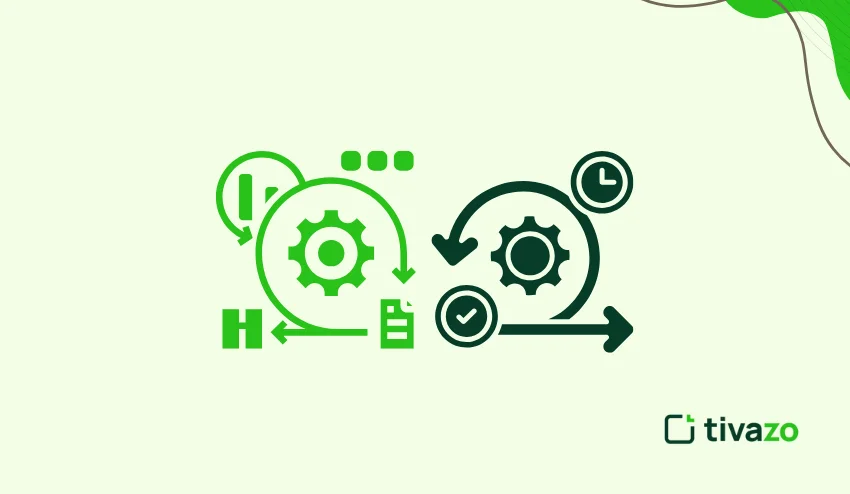Do your projects always go over budget or overtime? Being able to control expenses, assign resources, and monitor the cost of the project can be hectic without the appropriate systems in place. This is where project budgeting tools are used.
The tools are aimed at assisting businesses and project managers to plan budgets accurately, monitor spending and make informed decisions within a short time. When applied in the right manner, they save time, eliminate extra work, and aid in cost management and cost estimation– teams can spend their time working on projects and not on manual calculations and reporting.
In this guide, we are going to define what project budgeting is, why it is necessary to use such a tool, how these tools operate, the best five tools that can be used, and the advantages that such tools have in any organization. At the end, you will see why the project budgeting tools are a vital component of contemporary project management.
Key Highlights:
- What is Project Budgeting?
- Why Project Budgeting Should Be Used
- How Project Budgeting Tools Save Time, Effort, and Money
- How to Use Project Budgeting Tools Effectively
- Top 5 Project Budgeting Tools
- Benefits of Project Budgeting Tools
What is Project Budgeting?
Project budgeting refers to the act of planning, estimating and controlling all the expenditures of a project. It includes monitoring costs, resource management, and keeping the project within its budget.
Even the most carefully planned projects may have their costs exceed the budget, or be delayed or not completed at all without adequate budgeting. Project budgeting tools make this process easier by providing automation, real-time dashboards, and reporting capabilities so that managers can know precisely where the money is going.
The major project budgeting points are:
- Estimating the costs of projects: Planning the cost of each stage of the project.
- Resource allocation: Making sure that the proper people and materials are utilized effectively.
- Monitoring costs: Comparing the actual expenditure with the budgeted expenditure.
- Decision making: Real-time budget adjustments using the right financial information.
Organizations can track proper budgets, prevent wastage of funds, and have a successful project implementation through project budgeting tools.
Why Project Budgeting Should Be Used
Budgeting of projects is a necessity in every organization that seeks to execute projects within the budget, time, and quality. Effective budgeting enables teams to plan well, distribute resources efficiently, and minimize the chances of being surprised by financial changes. The application of project budgeting tools increases these abilities and has several benefits:
1. Improved Budget Management
Tracking project expenses manually can be time-consuming and prone to errors. Project budgeting tools allow managers to create detailed budgets for each phase of a project, monitor ongoing costs, and compare actual spending against planned budgets. This ensures that projects stay financially on track and helps avoid costly oversights.
2. Enhanced Cost Control
Project cost control is a key to profitability. Such tools enable teams to track billable and nonbillable hours, purchases, and expenses, and unexpected costs. Project budgeting tools provide managers with clear understanding of where the money is going, and therefore they can make adjustments before the costs get out of hand.
3. Better Resource Allocation
The important factor in completing projects efficiently is resource allocation. Project budgeting tools allow managers to assign strategically, avoid overworking team members, and make sure that resources are allocated to the most important tasks because they provide real-time data. This minimizes time wastage and improves output in the project.
4. Financial Transparency
Transparency is vital for stakeholder confidence. Project budgeting tools offer dashboards, reports, and visualizations that enable one to have a clear picture of the expenditure of funds. This enhances accountability in the team and the leadership can make sound decisions regarding changes, redistribution of resources or cost-cutting.
5. Increased Project Success
Through budget monitoring, cost control and resource management, organizations enhance success rates of project completion. Projects are better placed to stay on scope, on schedule and deliver on desired results. Finally, project budgeting tools in a project are also useful in keeping track of the finances but also in improving the planning, organization, and predictability of the whole project life.
Briefly, project budgeting tools adoption is not only about tracking costs. It is a tactical way of ensuring that projects become more structured, effective and successful and that every dollar and every resource is utilized.
How Project Budgeting Tools Save Time, Effort, and Money
One of the key advantages of project budgeting tools is that they have the potential to enhance precision and reduce the level of manual effort. These tools help teams to work on projects more efficiently, automating the processes, providing real-time insights, and simplifying reporting. Here’s how:
1. Save Time
- Automates the estimates of project costs and budgets, and ongoing costs.
- Provides project dashboards to see in real time how money is being spent on different projects.
- Less manual reporting time, so the teams can focus on actual project work.
- Lessens the need to check and correct the work more than once, and to waste the time of managers and team members.
2. Reduce Effort
- Simplifies the process of resource allocation and project scheduling and balances workloads.
- Automates budget planning and budget tracking and eliminates duplicative administrative tasks.
- Brings financial information together, hence all members of the team can access the same information without updating it manually.
- Reduces the occurrence of errors and miscommunication by keeping budgets, expenses and resources in one place.
3. Save Money
- Gives real-time visibility to avoid unwanted surprises and overspending.
- Streamlines the management of resources, eliminating inactivity and overstaffing.
- Improves cost management so that every dollar is put to good use.
- Assists managers in making sound decisions on reallocation of resources or change in spending.
Project budgeting tools allow project managers to run complex projects more quickly, simply, and at a reduced cost because of the combination of automation, real-time insights, and transparent reporting. Teams save time, minimise effort and maintain projects financially on track.
How to Use Project Budgeting Tools Effectively
To get the most out of project budgeting tools, it’s essential to follow some best practices:
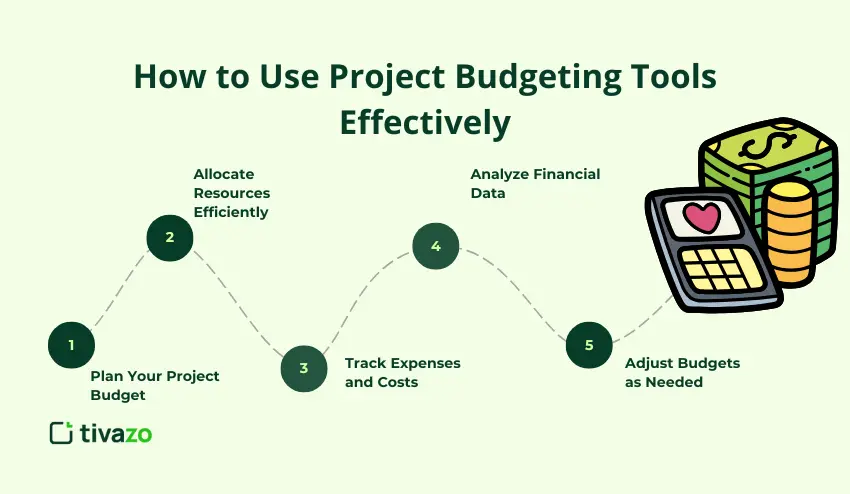
Step 1: Plan Your Project Budget
- Determine the scope of the project.
- Find out the price of every step, of every material, of every work, etc.
- Prepare a project budget that would assist in managing the project.
Step 2: Allocate Resources Efficiently
- Share the work based on skills and availability.
- Record proper times in the tool for better results.
- Do not work people to death and ensure they complete their tasks on time.
Step 3: Track Expenses and Costs
- Identify the areas to make the costs lean or cut.
- Monitor all the expenses of the projects in real-time.
- Track both billable and nonbillable hours to get the big picture.
Step 4: Analyze Financial Data
- Monitor the project funds using dashboards and reports.
- Find potential budget issues beforehand.
- Make good decisions regarding redistribution of resources or alteration of plans.
Step 5: Adjust Budgets as Needed
- In real-time update project budgets and resource management.
- Prevent cost overrun and maintain cost.
- Be open to the change in the scope of the project or to unexpected expenses that can result in success.
These steps will make your project budgeting tools as valuable as possible and will allow you to manage projects more effectively.
Top 5 Project Budgeting Tools
Let’s take a look at most five popular project budgeting tools that can help save time, effort, and money:
1. Tivazo
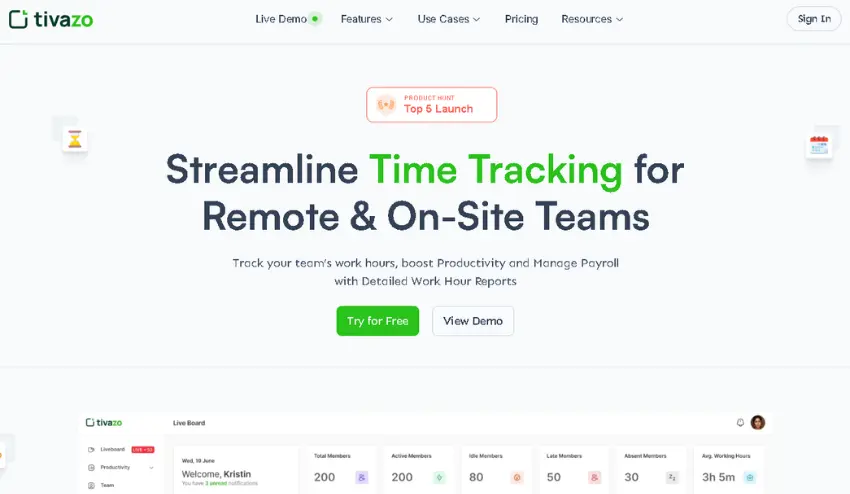
- Features:
- Tivazo gives Resource usage insight, time tracking and monitoring.
- Activity level reporting, screenshots and reporting app usage
- Tracking of projects, tasks, or client billing-hours
- Payroll-ready and invoicable timesheets
- Productivity analytics and custom reporting
- Best fit: Teams that need flexibility, customization and time budgeting.
- Advantages: It is applicable in tracking the budget of the project, the employees and ensure that the costs are kept down saving time and effort.
2. Smartsheet
- Functions: Real-time dashboards, expense tracking, project scheduling and resource management.
- Best suited: Teams collaborating and needing to see more than one project at a time.
- Pros: Simple user interface, powerful reporting and automation of repetitive budgeting tasks.
3. Microsoft Project
- Characteristics: Advanced budgeting, resource allocation and cost tracking.
- Best suited at: Large groups or organizations that must connect to a significant level with other Microsoft applications such as Excel, Teams, and SharePoint.
- Pros: It offers detailed dashboards, enables complex project structure, and there is a potential to track billable and nonbillable hours.
4. Zoho Projects
- Functionality: Billable hours, cost reports, financial tracking and project dashboards.
- Most appropriate: Small and medium sized companies that require a simple and basic project budgeting tool.
- Advantages: Cheap, user-friendly and gives a clear view of the project finances so as to make good decisions.
- If Zoho does not match your taste, you can use some Zoho alternatives with more advanced features.
5. Wrike
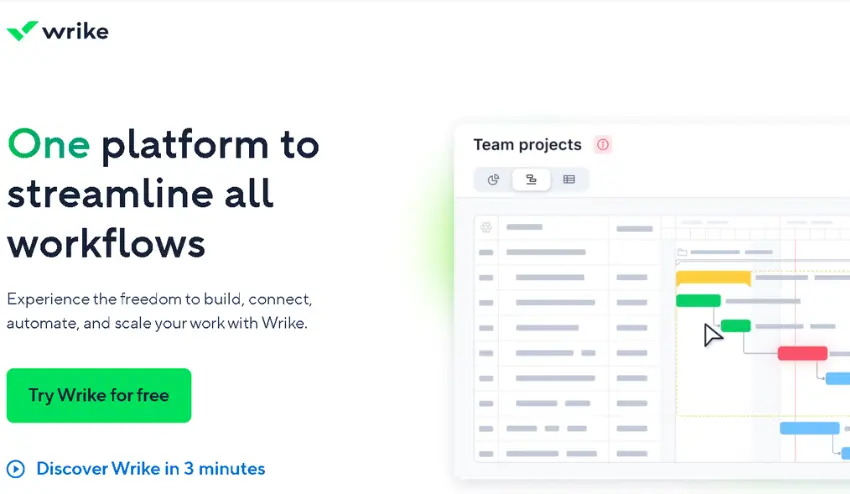
- Functions: Multi-project mangement and budgeting, cost management, project dashboards and resource plans.
- Suitable to: Agencies or teams that have a number of projects that are ongoing at any given moment with different budgets.
- Advantages: It is able to monitor many budgets simultaneously, enhances resource management and enables real-time updates to ensure that project budgets are current.
All these tools are project budgeting tools that are meant to reduce manual work, enhance accuracy and allow financial tracking and project planning. Your choice of the tool must depend on the size of your team, complexity of the project, and your budgeting needs.
Benefits of Project Budgeting Tools
The use of project budgeting tools has quantifiable benefits that enhance efficiency, accuracy, and the output of the project:
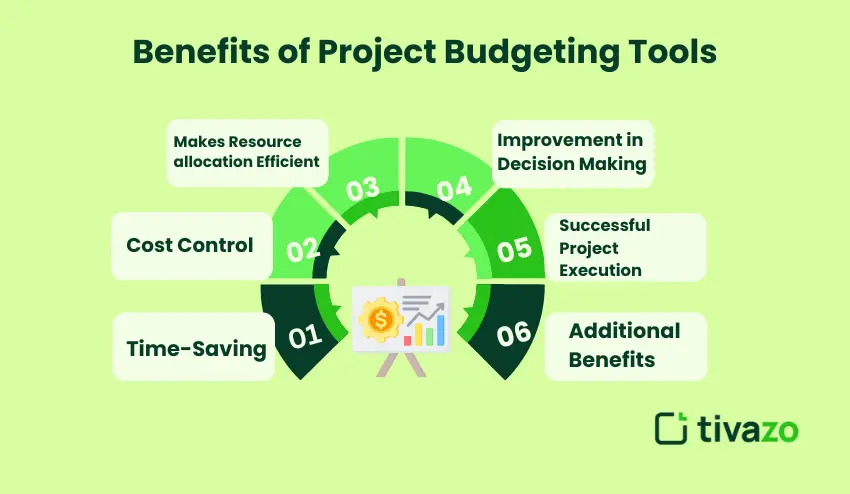
- Time-Saving
- Automates routine activities such as calculation, expenses monitoring, and reporting.
- Saves the time that teams would have spent on manual updates and enables them to work on project implementation.
- Cost Control
- Gives real time visibility of all project costs, avoiding budget overruns.
- Tracks billable and nonbillable hours, materials and other expenses so that the money is utilized efficiently.
- Makes Resource allocation Efficient
- Divides work based on skills and availability to avoid overloading.
- Streamlines projects to increase productivity.
- Improvement in Decision Making
- Provides real time data and access to financial data so that informed decisions can be made.
- Helps to anticipate the expenditures and make changes before the emergence of issues.
- Successful Project Execution
- Keeps projects on time, on track and on budget.
- Reduces the possibility of delays and unexpected costs
- Additional Benefits
- Encourages collaboration with centralized data.
- Reports clearly to stakeholders.
- Makes it easy to manage several projects, making budgeting a strategic asset.
By using project budgeting tools, organizations can streamline planning, control costs, and increase the likelihood of completing projects successfully.
Conclusion
The use of project budgeting tools is no longer optional, but is a necessity to make the project management efficient. They save time, effort and cost control, and enhance resource allocation and informed decision-making.
Implementation of the tools will help businesses to enhance the accuracy of project budgets, financial transparency, and the probability of successful project completion. When you need to keep your projects on schedule and within budget, one of the wisest choices you can make is to invest in the appropriate project budgeting tools


